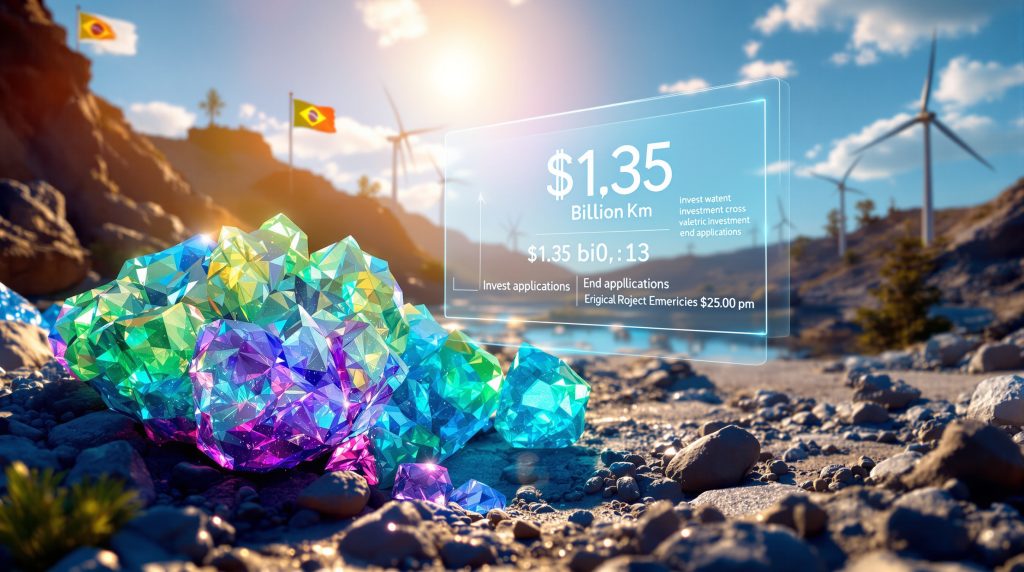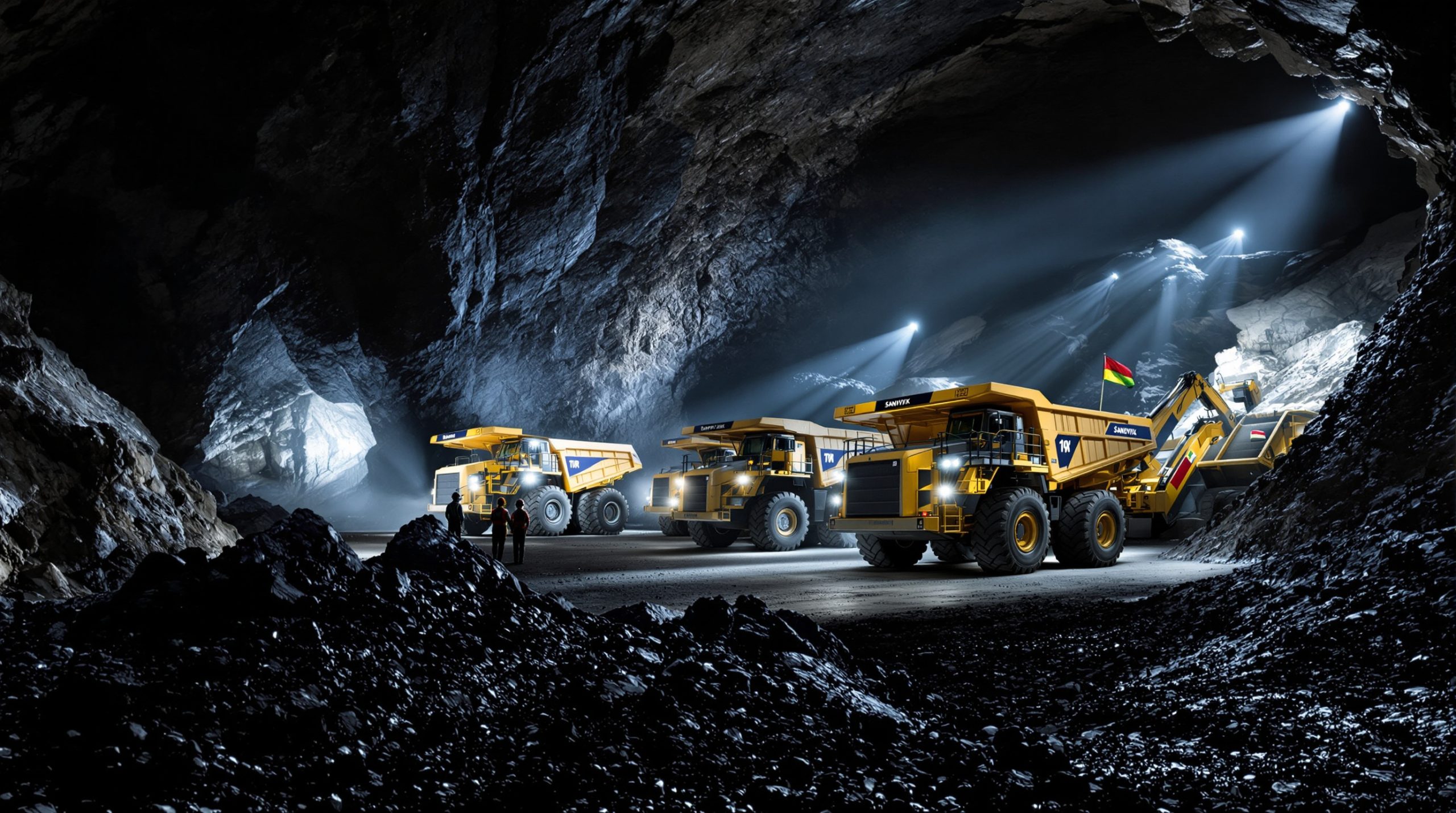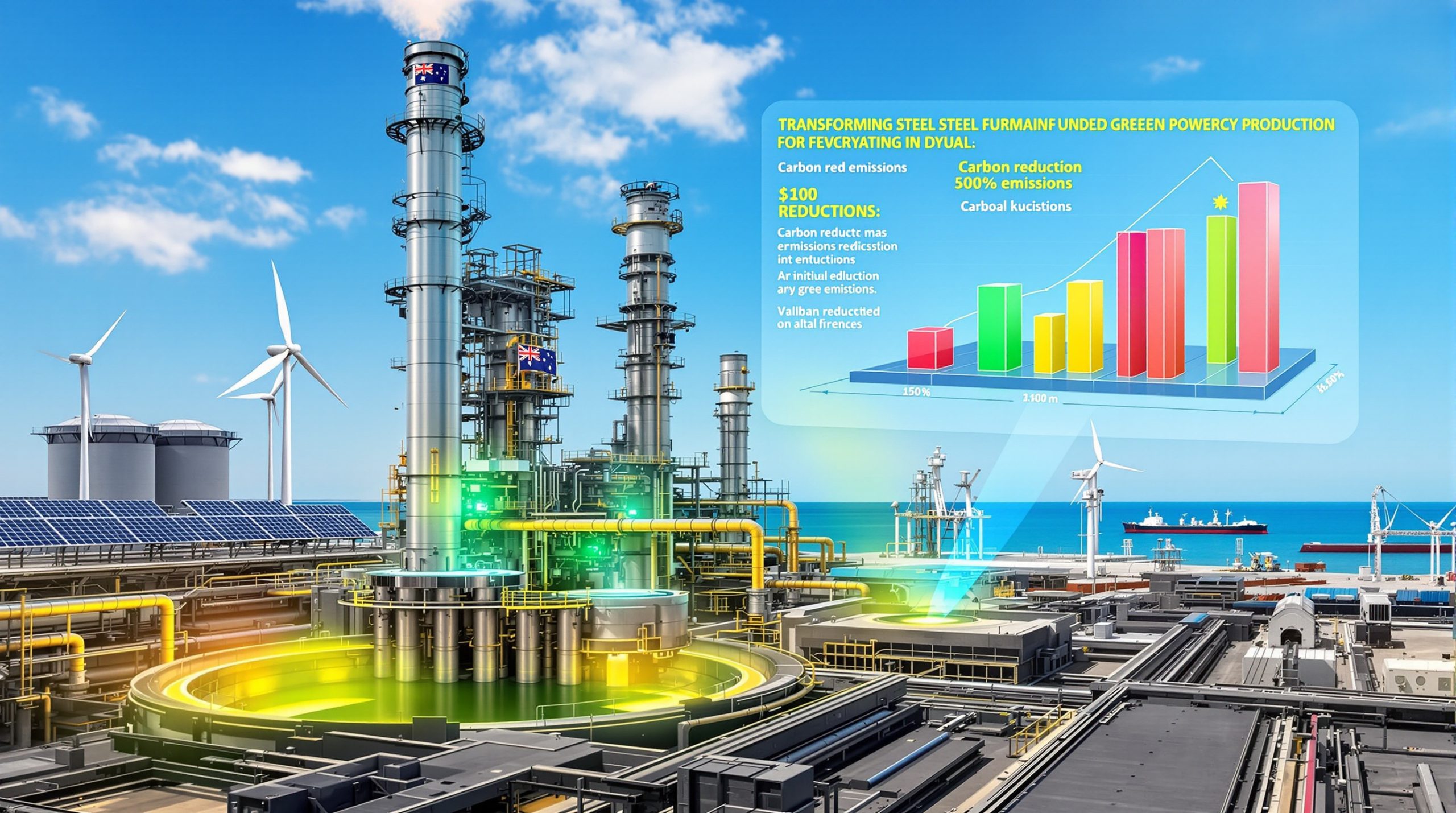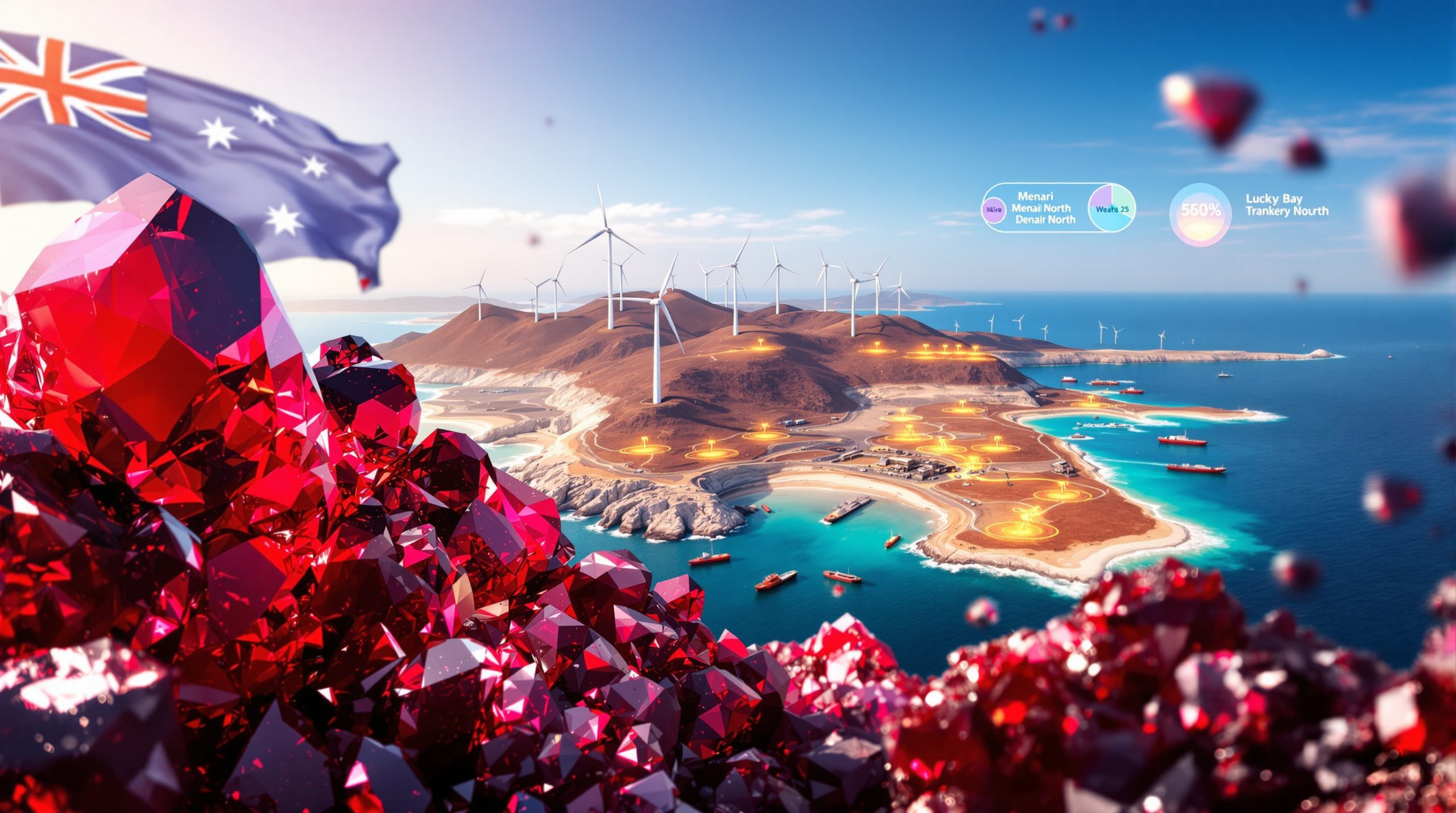Aclara Resources: Strategic Rare Earth Investment Opportunity
Aclara Resources represents a distinctive investment opportunity in the rare earth elements (REE) sector with its focus on sustainable extraction from ionic clay deposits in South America. The company combines environmental responsibility with strategic positioning in critical minerals transition essential for green technology and defense applications, establishing itself as a unique player in the global rare earths market.
The Strategic Value of Aclara's Rare Earth Focus
Aclara's strategic approach targets heavy rare earth elements, particularly dysprosium and terbium, which face significant supply constraints in global markets. These critical elements are essential components in high-performance magnets used in electric vehicles, wind turbines, and various defense applications.
The company is deliberately developing projects outside China, addressing Western supply chain vulnerabilities that have become increasingly apparent in recent years. With China controlling approximately 85% of global rare earth processing capacity, Aclara's South American operations represent an important diversification for Western supply chains.
Additionally, Aclara is implementing innovative, environmentally-conscious extraction technologies that significantly reduce the environmental footprint compared to traditional rare earth mining operations. Their vertical integration strategy spans from mining operations through processing, allowing for greater control over quality and supply reliability.
How Is Aclara Positioning in the Global Rare Earth Market?
$1.3 Billion Strategic Investment Plan
Aclara has developed a comprehensive $1.3 billion investment strategy allocating capital across multiple strategic assets, as confirmed by Executive Vice President Jose Augusto Palma in September 2025. This significant capital commitment demonstrates the company's long-term vision and confidence in the rare earth market fundamentals.
The investment is strategically distributed across several key components:
| Project Component | Investment Range | Purpose |
|---|---|---|
| Chilean Mining Operation | $150-170 million | Extraction from Penco project |
| Brazilian Mining Operation | $600 million | Development of flagship Carina project |
| Separation Facility | $300-400 million | Processing capability in North America |
| Metallization Facility | $400 million | Downstream value addition |
This multi-faceted approach aims to establish Aclara as a vertically integrated rare earth supplier with control over the entire value chain from mining to finished materials, reducing dependency on third-party processors and creating additional value opportunities.
Timeline for Development and Production
The company has established an ambitious but structured timeline for bringing its projects online:
- Mid-2026: Completion of feasibility studies for both Brazilian and Chilean projects
- Late 2026: Construction commencement following feasibility completion
- 2028: Targeted production start at both South American operations
- Pilot operations already underway for technology validation
This development schedule aligns with projected increases in demand for heavy rare earth elements, particularly from the electric vehicle and renewable energy sectors, which are expected to accelerate significantly after 2025.
Why Are Aclara's South American Projects Strategically Important?
The Carina Project: Brazil's Rare Earth Flagship
The Carina project in Brazil represents Aclara's most significant asset, with substantial potential to influence global rare earth supply dynamics. The company has allocated $600 million to develop this project, highlighting its strategic importance to their overall business plan.
Key aspects of the Carina project include:
- Significant production capacity that could meaningfully impact global supply
- Projected long-term mine life providing supply security for potential customers
- Rich concentration of heavy rare earths crucial for permanent magnets
- Strong government support from Brazilian authorities
- Pilot operations initiated to demonstrate technical viability
The project's location in Brazil's Goiás state provides geopolitical advantages for Western nations seeking to reduce dependency on Chinese rare earth supplies. The U.S. International Development Finance Corporation's commitment of up to $5 million for the project's feasibility studies underscores the strategic importance of this development to American interests.
The Penco Module: Chilean Rare Earth Development
Complementing the Brazilian flagship, the Penco project in Chile represents a smaller but strategically important component of Aclara's portfolio with planned investment of $150-170 million. This dual-country approach provides:
- Geographic diversification reducing single-country operational risk
- Complementary resource profiles enhancing product mix
- Similar timeline to Carina with 2028 production target
- Potential operational synergies across South American operations
This two-country approach demonstrates Aclara's regional expertise and commitment to establishing a significant South American rare earth production base as an alternative to traditional Asian suppliers.
How Is Aclara Addressing Processing Challenges?
Building North American Processing Capabilities
The most significant bottleneck in rare earth supply chains is processing capacity, which remains heavily concentrated in China. Recognizing this critical issue, Aclara is investing between $300-400 million in separation facilities and an additional $400 million in metallization capabilities.
This substantial processing investment focuses on:
- Development of advanced separation technologies for individual rare earth elements
- Production of high-purity rare earth oxides needed for magnet manufacturing
- Strengthening domestic US supply chain resilience
- Developing specialized expertise in separating heavy rare earths including dysprosium and terbium
By establishing processing capabilities in North America, Aclara aims to create a complete mine-to-magnet supply chain outside of Chinese control, addressing a critical vulnerability in Western industrial strategy.
Strategic Partnerships and Government Support
Aclara is actively engaging with key stakeholders to secure project financing and support. The recent commitment from the U.S. International Development Finance Corporation of up to $5 million for Brazilian project feasibility studies demonstrates growing government interest in supporting rare earth supply chain development.
Additional partnership opportunities include:
- Potential engagement with the Department of Defense regarding strategic mineral supply
- Discussions with the US Energy Department on critical minerals initiatives
- Possibilities for additional government loans and grants to reduce project risk
- Partnerships with end-users seeking supply chain security
These relationships reflect growing recognition among Western governments of the strategic importance of securing rare earth supply chains, particularly for elements critical to defense and green technology applications.
What Makes Aclara's Extraction Technology Different?
Circular Mineral Harvesting: A Sustainable Approach
Aclara claims its proprietary technology offers significant environmental advantages compared to traditional rare earth mining methods. Their approach is particularly well-suited to the ionic clay deposits found in their South American projects, which are geologically similar to some of the most productive rare earth sources in southern China.
The company emphasizes several key environmental benefits:
- Efficient water management through recirculation systems
- Recovery and reuse of chemical reagents reducing waste
- Elimination of conventional blasting, crushing and milling operations
- Commitment to complete rehabilitation of mining areas
- Reduced overall environmental footprint compared to conventional operations
If validated through independent assessment, these technological advantages could position Aclara as an environmentally preferred supplier in a sector often criticised for its environmental practices.
Environmental and Social Governance Benefits
Beyond technical advantages, Aclara's approach addresses key ESG concerns that have become increasingly important to investors and customers in the rare earth sector:
- Reduced water consumption compared to traditional mining methods
- Lower chemical usage and waste generation
- Smaller physical footprint with less ecosystem disruption
- Commitment to local community engagement and development
- Transparent reporting on environmental performance
These ESG considerations are increasingly important for end-users in consumer-facing industries who must demonstrate responsible sourcing practices throughout their supply chains.
What Market Factors Support Aclara's Investment Case?
Growing Demand for Critical Rare Earths
Market dynamics strongly favor Aclara's focus on heavy rare earths, with several major technology trends driving demand:
- Electric vehicle production requiring high-performance magnets containing dysprosium and terbium
- Expansion of wind energy capacity, particularly offshore installations using rare earth generators
- Defense applications including guidance systems, radar, and electronic warfare equipment
- Medical technologies such as MRI machines utilizing rare earth components
- Growth in consumer electronics with miniaturised motors and speakers
Industry forecasts suggest demand for heavy rare earths could grow at 8-12% annually through 2030, creating potential supply shortages without significant new production capacity.
Supply Chain Security Concerns
Geopolitical factors enhance Aclara's strategic positioning, with Western nations increasingly concerned about overreliance on Chinese rare earth supplies:
- Active government initiatives seeking to develop non-Chinese rare earth sources
- Financial incentives and support for domestic and allied nation supply chains
- Recognition of rare earth elements as critical to national security
- Corporate end-users implementing supply diversification strategies
- Growing premium pricing for "politically secure" rare earth supplies
These security considerations create potential market advantages for Western-friendly suppliers like Aclara, possibly allowing for premium pricing and preferential offtake agreements with strategic customers.
How Does Aclara Compare to Other Rare Earth Investments?
Competitive Advantages
Several factors differentiate Aclara from other rare earth development companies in the Western market:
- Focus on heavy rare earths with higher value and more constrained supply
- Ionic clay deposits similar to those found in southern China, offering processing advantages
- Lower anticipated processing costs compared to hard rock rare earth mining
- Environmental credentials potentially appealing to ESG-conscious customers
- Vertical integration strategy from mine to separated elements
These distinguishing characteristics position Aclara in a different category from many Western rare earth mining ventures that focus primarily on light rare earth elements from hard rock deposits.
Risk Considerations
Investors evaluating Aclara should consider several risk factors inherent in rare earth development projects:
- Substantial capital requirements for full implementation of strategy
- Technical challenges in scaling up processing technology from pilot to commercial scale
- Market price volatility for rare earth elements
- Potential for increased competition from other emerging producers
- Regulatory and permitting timelines in host countries
The company's ambitious vertical integration strategy also introduces execution risk across multiple project components and jurisdictions, requiring effective management and coordination.
What Are the Investment Implications?
Potential Returns and Valuation Metrics
While independent validation of economic projections is essential, Aclara's rare earth projects offer several potential return drivers:
- Long production timeline (20+ years) providing sustained revenue potential
- Premium pricing likely for non-Chinese heavy rare earth sources
- Strategic value beyond financial metrics due to supply chain importance
- Potential for government support to enhance project economics
- Vertical integration capturing additional margin throughout the value chain
Investors should carefully evaluate how these factors might translate into financial returns, particularly in light of the substantial capital investment required.
Investment Timeline Considerations
Investors considering Aclara Resources rare earths investment should understand the extended development timeline:
- Current phase focused on feasibility studies and pilot operations
- Major capital deployment expected 2026-2028
- Production revenue beginning around 2028
- Full vertical integration benefits realised post-2028
This timeline suggests Aclara represents a medium to long-term investment opportunity rather than a near-term producer, with significant milestones over the next 3-5 years potentially creating valuation inflection points.
What Questions Should Potential Investors Ask?
Due Diligence Considerations
Thorough evaluation of Aclara as an investment opportunity should include investigation of several key areas:
- How do feasibility study results compare to initial projections?
- What offtake agreements or customer commitments have been secured?
- How is financing structured for the various project components?
- What technical challenges remain in scaling up from pilot to commercial production?
- How will changes in rare earth market prices affect project economics?
- What regulatory approvals remain outstanding in host countries?
Investors should also evaluate management's track record in delivering mining projects of similar scale and complexity, particularly given the technical challenges inherent in rare earth processing.
FAQ: Aclara Resources Rare Earth Investment
How does Aclara's approach differ from traditional rare earth mining?
Aclara utilises ionic clay deposits that allow for more environmentally friendly extraction without traditional blasting, crushing, or milling. Their technology reportedly recirculates water and reagents while minimising land disturbance compared to conventional mining operations. This approach is similar to methods used in southern China but with additional environmental safeguards.
Why are heavy rare earths like dysprosium and terbium particularly valuable?
Heavy rare earths face more severe supply constraints than light rare earths, with production heavily concentrated in China. These elements are critical for high-performance permanent magnets used in electric vehicles, wind turbines, and defense applications. They enable magnets to maintain performance at high temperatures, which is essential for many advanced applications, resulting in premium pricing due to limited supply alternatives.
What government support is Aclara receiving?
Aclara has secured commitment from the U.S. International Development Finance Corporation for feasibility study funding of up to $5 million for its Brazilian project. The company is likely positioned to benefit from Western government initiatives to secure critical mineral supply chains, particularly under Trump's critical minerals order prioritising domestic and allied nation resource development.
When might Aclara begin generating revenue?
Based on current development timelines, Aclara targets commercial production beginning in 2028, with construction of mining operations expected to commence in late 2026 following completion of feasibility studies. This suggests a medium-term horizon for potential investors seeking production-stage returns.
What are the main risks to Aclara's development plans?
Key risks include substantial capital requirements for full implementation, technical challenges in scaling processing technology, rare earth price volatility, potential regulatory delays, and execution risks associated with simultaneous development of multiple project components across different jurisdictions. The rare earth sector also faces potential competition from recycling initiatives and magnet technology innovations that could affect long-term demand.
Further Exploration
Readers interested in learning more about rare earth elements and their strategic importance can explore related educational content available on Greenland's critical minerals and evolving mining trends. Understanding the complex interplay between technology demands, geopolitical factors, and modern mine planning technology is essential for evaluating investments in this strategically important sector.
Looking for Early Investment Insights on ASX Mining Discoveries?
Discovery Alert's proprietary Discovery IQ model instantly identifies significant mineral discoveries on the ASX, providing actionable investment insights before market movements occur. Explore our dedicated discoveries page to see how early identification of major mineral finds can transform your investment portfolio.




